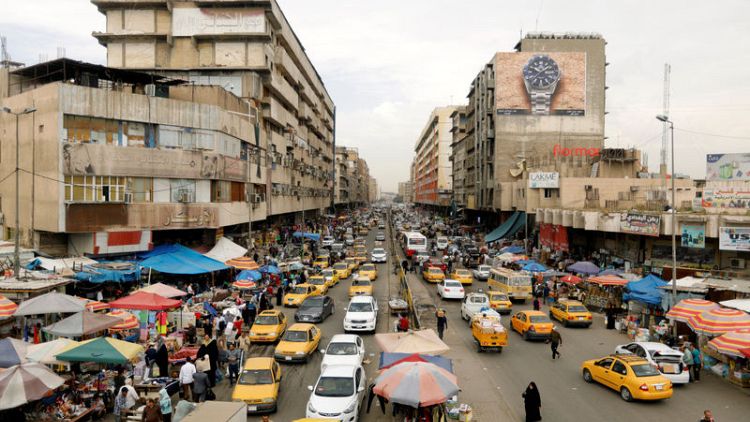By Maher Nazeh
BAGHDAD (Reuters) - With the blast walls finally gone, some 16 years after the U.S.-led invasion, life in the Iraqi capital Baghdad is starting to look like any normal bustling city.
Families and friends hang out in cafes and shopping malls, people hold birthday parties in public and traders ply their wares from roadside stalls.
Saif Ahmed, an owner of a cafe in the upscale district of Zayyona in eastern Baghdad, said the removal of miles of the concrete walls from the streets had encouraged families to visit malls and cafes and stay until late into the night.
"Baghdad is looking different now, for the better. Families are staying until after midnight in markets, restaurants and cafes. I feel so happy to see Baghdad life is returning to normal," he said.
The walls, put up a year after the U.S.-led invasion in 2003, served to protect the city from years of sectarian civil war and the fight against Islamic State militants. Iraq declared victory over the group in late 2017.
Senior military commanders say there have been no attacks by insurgents for more than a year.
"Baghdad is enjoying considerable security. We managed to keep terrorists away from the capital," said Lieutenant General Jaleel al-Rubaie, commander of the Baghdad Operations Command.
Soon after he came to power late last year, Prime Minister Adel Abdul Mahdi ordered the removal of the towering walls to signal the improvement in security - letting light back into long obscured parts of the city.
For Hutham al-Ansary, who lost her husband in the violence in 2004, the feeling that Baghdad is finally safe brings tears of happiness.
"Baghdad is beautiful, despite all tragedies, with this improved security and peace. I still have a bitter feeling about the past but today is better than yesterday," said Ansary, a women's rights activist, with her two daughters at one of Baghdad's parks.
Many people are now more comfortable about spending time outdoors.
"I'm happy that finally I can celebrate my son's birthday in a public garden, something we were not brave enough to do fearing bombs," Sally Adnan, a Health Ministry employee, said at Abu Nawas Gardens by the Tigris river.
"Life in Baghdad is more interesting now," said Adnan, who was wounded in a car bomb in 2008.
"The wounds on my face are part of Iraq's history. I'm keeping them to show my sons when they grow up,” she said.
(This story corrects garble in first paragraph)
(Reporting by Maher Nazeh; Writing by Ahmed Rasheed; Editing by Ahmed Aboulenein and Alison Williams)


